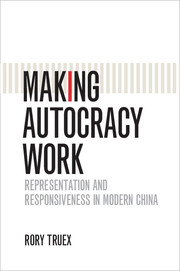Book contents
2 - A Theory of Authoritarian Representation
Published online by Cambridge University Press: 13 October 2016
Summary
Miscalculating
On February 27, 1957, CCP Chairman Mao Zedong ushered in a brief period of openness for the newly consolidated communist state. His speech, entitled “On the Correct Handling of the Contradictions among the People,” urged other CCP elites to “let a hundred flowers bloom; let a hundred schools of thought contend.” Months before, Premier Zhou Enlai had articulated the need for a public voice in policy making, citing unrest in Eastern Europe:
The government needs criticism from its people …Without this criticism the government will not be able to function as the people's democratic dictatorship. Thus the basis of a healthy government is lost …We must learn from old mistakes, take all forms of healthy criticism, and do what we can to answer these criticisms.
Zhou's reasoning gained the support of Mao, who formally announced the plan in February. The goal was to rid the government of its “three evils” – bureaucratism, sectarianism, and subjectivism – by fostering vigorous societal debate (Doolin 1961; Goldman 1962; MacFarquhar 1974). More open discussion would be good for the Party, and foster unity and loyalty among those yet to embrace its rule.
Mao's call was initially met with suspicion among would-be reformers. After some reassurance, intellectuals, students, and members of nominal democratic opposition parties began speaking their minds. University campuses became centers of reformist campaigns. A group of Peking University students created a “Democracy Wall,” pasting up posters lampooning CCP authority and Mao himself (Goldman 1962). Letters of criticism overwhelmed government and Party offices.
NPC deputies took a prominent role in the movement. They advocated for democratic reforms and an enhanced role for the parliament. Deputy Tan Tiwu demanded Party organs be made subservient committees under the authority of the NPC (O'Brien 1990).
- Type
- Chapter
- Information
- Making Autocracy WorkRepresentation and Responsiveness in Modern China, pp. 15 - 45Publisher: Cambridge University PressPrint publication year: 2016



